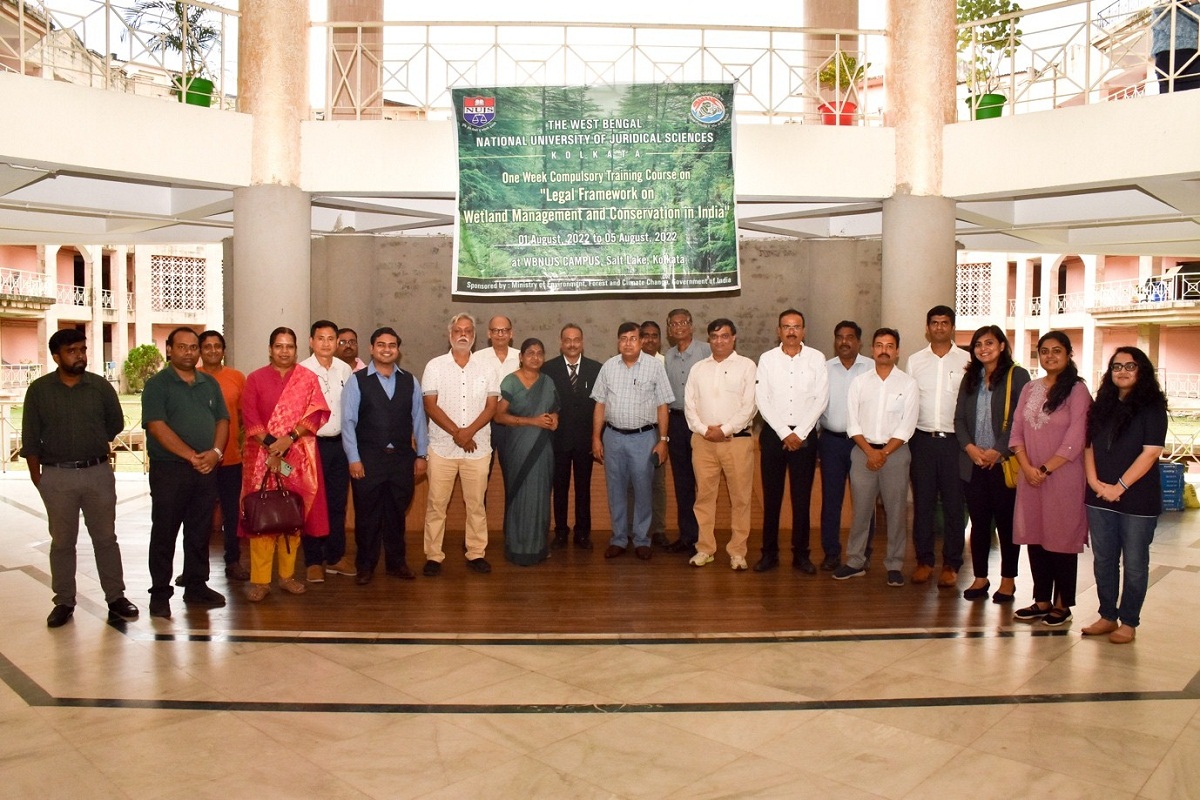The WB National University of Juridical Sciences (WBNUJS), under the guidance of our Hon’ble Vice-Chancellor Prof. (Dr.) Nirmal Kanti Chakrabarti was nominated by the Ministry of Environment, Forest & Climate Change, Government of India for conducting a One-Week Compulsory Training Course on “Legal Framework on Wetland Management and Conservation in India”. The training programme was organized at WBNUJS from August 01, 2022, to August 05, 2022, for Indian Forest Service (IFS) officers in physical mode.
13 Indian Forest Services Officers from all over the country have attended the programme and provided their valuable attention, engagement and feedback. Once again, it has been indeed a pleasure to host these officers and have them engage in a series of informative discourse. This discourse lasted for 5 days each of which were demarcated into several sessions including a field trip to the East Kolkata Wetlands.
On the first day, our inaugural session was graced by Shri Vivek Kumar, IAS, Shri Balamurugan K, IFS, and Prof. Dr. Nirmal Kanti Chakrabarti, Vice Chancellor NUJS. Prof Dr. Arup Poddar offered his immensely knowledgeable insights into the course. Followed by the inaugural session were a slew of sessions addressed by Prof. Dr. MK Ramesh, Dr. Nathalie Doswald, and Dr. M.P. Chengappa who broadly spoke on the legal framework of wetland management and conservation in India and at the international level.
The second day of the course commenced with a field visit to East Kolkata Wetlands which was led by Shri Balamurugan K. Upon the return of the officers from the trip, three sessions were held helmed by Prof. Vijay Kishore Tiwari, Dr. Ritesh Kumar, and a team of researchers comprising Riti Naik, Misthi Saha, and Aarushi De. The discourse on the second day revolved around the international framework on conservation and management of wetlands followed by a discussion on the landmark judgments on these issues.
The third day started with a brainstorming session on the theme by Prof. Dr. Sairam Bhat. This was followed by address by Dr. Raktima Mukhopadhya on community management. Dr. Shambu Chakrabarty took over for the next session highlighting international best practices on the conservation and management of wetlands. This was followed by Dr. Sujata Roy offered her own analyses on the theme of application of the CSR fund for the management and governance of wetlands in India. The day was concluded with an interactive session by Hon’ble Expert Member of the NGT, Mr. Saibal Dasgupta who gave an insight into the role of the NGT in environmental issues with special focus on wetlands.
The fourth day witnessed an exchange of deliberations with Ms. Kankana Das, who shared her experience in governance of wetland. A special address by Ms. Sue Willman on Sundarbans provided for detailed idea on the tricky matters concerning the theme. Followed by her, the founder President of PUBLIC Ms. Bonani Kakkar generously offered her analysis on the role of civil society. Later on, Shri Ranjan Chatterjee, retired IAS officer, comprehensively shared his experience on wetland management all the way from New York. The final session comprised a case study of Chilika lake led by Yathansh Joshi and Toshita Jha. The said session was presided by Dr. Sanjit Kumar Chakraborty and Dr. Atul Alexander, faculties at NUJS.
The final day encapsulated the discourse over the five days. The first session was presided by Shri Balamurugan Sir wherein delegates discussed their experience and the challenges faced. Ms. Meghna Banerjee took over in the next session and mulled over environmental litigation and the challenges faced in such litigation. The post lunch session was spearheaded by Dr. Manojit Ghose who spoke about the economic utility of wetlands. This was followed by Smt. Padma Mahanti, IFS Officer, who shared her experience with respect to the wetlands in Kerala.
The Training Course overall has been a learning experience. All in all, the programme endeavoured to offer legal, administrative and practical outlook to the theme in question. With the resource persons coming from different backgrounds, the deliberations were rich, exhaustive and research-backed.
One Week Compulsory Training Course on Legal Framework on Wetland Management and Conservation in India









 Users Today : 552
Users Today : 552 Users Last 7 days : 4683
Users Last 7 days : 4683 Total views : 1093015
Total views : 1093015